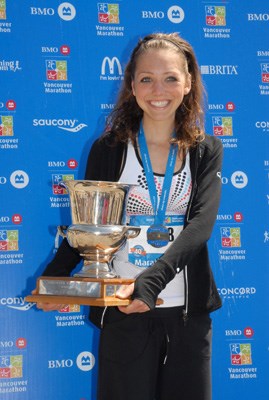Three Canadian runners, including a new-to-Vancouver (via Kingston, Ont.) long-distance runner, have qualified for the Summer Olympics in London. The country hasnt sent this many male racers to the Olympics since Atlanta in 1996. But the roster may not be complete because two women, Krista DuChene and Lanni Marchant, both originally from Ontario, are appealing for their tickets to London.
To qualify for the Olympics, women marathoners in this country must meet Athletic Canadas standard of two hours, 29 minutes and 55 seconds. No Canadian woman has ever met this threshold. In the Netherlands last month at the Rotterdam Marathon, both women came within two minutes of the standard and lodged themselves among the top 10 fastest times on Canadian record. DuChene finished seventh overall in 2.32.06. Marchant was 16 seconds faster at 2:31.50 and placed fifth.
If these women ran these times at the 2008 Beijing Games, Marchant would have placed 21st in an international field of 82 of the worlds fastest women at that distance. DuChene would have tied Australian Benita Johnson for 22nd. At the most recent track and field world championships in 2009, those times would have put Marchant at 22nd and DuChene at 23rd. But they will not likely travel to London.
The Olympic standard is 2:37.00 but Canada, like other countries, sets their own because the time is considered too lenient. But Canadas 2.29.55 is much tougher than other countries. Britains women aim for 2:31.00 and Australias 2:32.00, times which neither DuChene nor Marchant met. However, on Wednesday this week, the pair submitted an appeal to Athletics Canada. They point to other countries (such as Britain) that made exceptions for competitors and argue they qualify as rising stars and could be recognized as promising athletes new to the sport who have dramatically lowered their times. DuChene is 35. Marchant is 28. Marathon runners remain competitive well into their 30s. The Romanian racer who beat the pack in Beijing was 38.
The other option is for Athletics Canada to take the top three women in the country, as long as they meet the Olympic standard before April 22, which DuChene and Marchant did by more than four minutes. This is how the U.S. picks its athletes, seven of whom ran faster times than Canadas two fastest women so far this year. Which hints at the ultimate shortcoming in this country. DuChene and Marchand could be Canadian role models because they succeeded in London, not because they challenged their governing athletic association to get there.
The BMO Vancouver Marathon is Sunday. The fastest woman last year was Keddi-Anne Serbino of Ladner who now competes for the University of B.C. in Kelowna. At 21, she covered the distance in 2:43.40 and was named one of South Deltas top 30 citizens under 30 by a city newspaper. Considered one of this countrys high hopes at future Olympic Games, Serbino out-ran the next Canadian by nearly 17 minutes. We need more women competing on the world stage and its in the power of Athletics Canada to do something about it this year. We dont have to lower our expectations, but can give more women opportunity to meet them.
Twitter: @MHStewart



